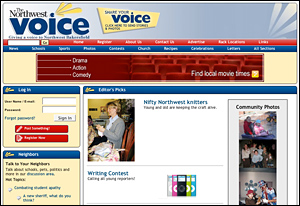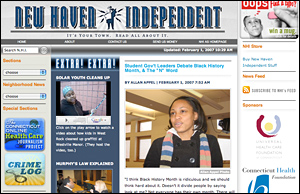What exactly is a hyperlocal citizen media site? It is a multimedia digital unspooling that reflects life in a particular place, typically with a rolling front page where posts go up in blog-like chronological order. Many display professionally produced local coverage (whether originated by a small paid staff, imported from an owner-newspaper, or linked to by volunteer staffs). Citizen postings take center stage on some sites or are relegated mostly to comments and photo galleries on others. Sites also typically feature event calendars, mission statements, tutorials on how to contribute text and images, local blog feeds and government and business directories. Many include poetry or creative writing, columns on gardening or sports or other topics and vast photo galleries, with featured photos on the front page.
The micro-news on citizen media sites creates an effect of inclusiveness and intimacy many users find lacking in their local press.
Site operators frequently cited local daily (45%) or weekly (44%) newspapers as their competition, but others say the competition is every other web offering – from neighborhood listservs (21%) to social networking favorites that define community as the world.
Many sites emphasize, and others create space for, the kinds of micro-news that daily papers lack the staff or pages to cover: 35th wedding anniversaries, galleries of prom pictures, Rotary Club news. These may be of interest to just one subdivision or even one family, but the effect is one of inclusiveness and intimacy many users find lacking in their local press.
While some hyperlocal ventures are built around web sites, many others are essentially blogs. They are less individual soapboxes, however, than easy-to-use software systems for managing community content.
Sites are set up as businesses, as non-profits or as ad hoc citizen ventures. In our survey, 139 respondents split evenly: Half described their sites as for-profit operations, and half non-profit. Among the profit-seekers are entrepreneurs inventing new kinds of media companies to tap user-generated news and information and to build revenue models based on local shopping, local search and online advertising.

Northwest Voice
Also on the for-profit side are legacy media companies who see news holes and ad revenues declining and reader dissatisfaction ascending. They’re launching hyperlocal sites to preserve or extend their reach into their local markets, to capture online advertising and, not least, to repair bonds with their communities and deepen citizens’ attachments to each other. Only those who know and care about where they live will pay for coverage, the thinking goes.
Many of these newspaper-owned sites are thick with user-generated “chicken dinner” content that is reverse-published into ad-rich, free home-delivered weeklies. Several of these sites – hybrids of professional staff who solicit and produce content, and citizens – show great promise in both profitability and sustainability; Bakersfield’s Northwest Voice site became profitable in about a year. Unlike many non-profit sites, they’re not as dependent on the free labor of a committed corps who hope replacements will step up before they burn out.
In another category are the for-profit solo site operators who don’t seem terribly concerned with making money, at least not immediately. Like Baristanet.com co-owners Debbie Galant and Liz George, many site operators say they’re rewarded by inventing as they go and watching citizens propel the enterprise with the surprising contributions they make.
Some of these small-scale site operators are able to claim profitability only because they count their server bills as practically their only expenses, and discount their thousands of hours of unpaid labor. Two questions bedevil some within this group: How big a town or collection of towns does one need to sell enough local or national ads to support a business? Should ad revenues be shared with the most-read or most-active contributors – and if so, how?

New Haven Independent
Then there’s the most diverse category: the non-profits. These include disaffected journalists turning to foundations to support local coverage and citizen training. Both New Haven Independent and Chitowndailynews.org in Chicago are initiatives by veteran journalists to create digital-age forms of alternative media. Other non-profit sites were launched by groups or individuals attempting to build a place for the kinds of coverage and discussion they can’t find in the press, and by collectives who are testing the proposition of whether citizens will pay public radio-style memberships to support community sites.
A few sites – such as the new media start-up NewWest.net, which covers 11 Rocky Mountain centers, and VillageSoup.com in Maine – put more emphasis on “local” than on citizen content. The proprietors of both sites believe professionally produced content is vital to creating interest and generating traffic. Much of their citizen content comes through comment threads and photos.
